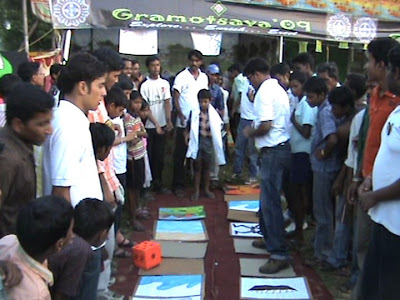World Aids Day provides an opportunity for all of us - individuals, communities and leaders to take action and ensure that human rights are protected and global targets for HIV/AIDS prevention, treatment and care are met. This event therefore was important in reminding the student community that HIV has not gone away, and that there are many things still to be done. This event provided an opportunity to about 600 students of Business Management, Rural Management and Social work on the XIMB campus to get involved with SRC in spreading the message of World Aids Day.
Mr. Amiya Bhusan Biswal, President, Utkal Sebak Samaj along with Ms. A. Tulsi Rao, Treasurer, ONP+, Prof. Latha Ravindran and Prof. Peppin of XIMB and Madhu Chhanda Panda, the capacity building officer of GFATM at XIMB, were present for this event including the GFATM Team of XIMB and NISWASS.
SRC in collaboration with GFATM organized a Collage Competition at XIMB on 1st Dec 2010 to mark World AIDS Day. The Theme of the competition was 'ACT AWARE’. This was followed by a skit and a street play conducted by the students of XIMB & NISWASS respectively. The street play performed by the students of NISWASS was based on the theme “HIV infections through injecting drug use” and the skit by the students of XIMB was based on the theme “Stigma and Discrimination at the work place”
This was followed up by a ribbon tying ceremony carried out by the SRC Members and also distribution of IEC Materials, sponsored by CONCERN Worldwide, to the students of XIMB and NISWASS. This was followed by students giving their views regarding HIV/AIDS on the World AIDS day wall. Exhibition of the Collages and Drawings made by children of Harsha Memorial was put up for viewing.
This was followed by speeches by inspirational speeches about the importance of World AIDS day by the guests. The concluding remark was “The fight is far from over, and the struggle continues. We need to ensure that global commitments are translated into increased support for PLHAs (People living with HIV AIDS) at the community level. Youth, especially men and boys must be our partners in transforming behaviors that endanger the health of society at large.”

















